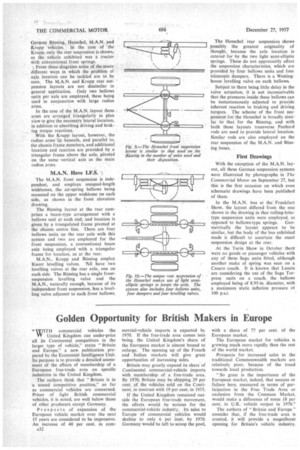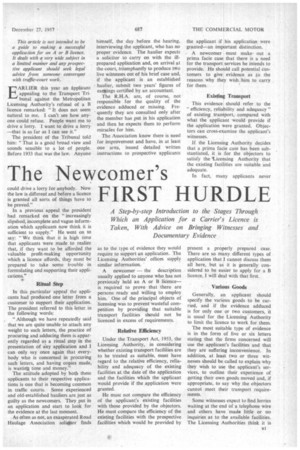Golden Opportunity for British Makers in Europe
Page 34

Page 35

If you've noticed an error in this article please click here to report it so we can fix it.
" WITH commercial vehicles the United Kingdom can under-price all its Continental competitors in the larger type of vehicle," states " Britain and Europe," a new publication prepared by the Economist Intelligence Unit. Its purpose is to provide a detailed assessment of the effects of membership of a European free-trade area on specific industries in the United Kingdom.
The authors think that "Britain is in a sound competitive position," so far as commercial vehicles are concerned. Prices of light British commercial vehicles, it is noted, are well below those of other producers except Germany.
Prospects of expansion of the European vehicle market over the next 15 years are considered to be impressive. An increase of 40 per cent. in corn A32 mercial-vehicle imports is expected by 1970. If the free-trade area comes into being. the United Kingdom's share of the European market is almost bound to enlarge. The opening up of the French and Italian markets will give great opportunities of increasing sales.
Britain may greatly expand its share of Continental commercial-vehicle imports with membership of a free-trade area. By 1970, Britain may be shipping 29 per cent, of the vehicles sold on the Continent, in contrast with 19 per cent. in 1955.
If the United Kingdom remained outside the European free-trade movement, the effects would be serious for the commercial-vehicle industry. Its sales to Europe of commercial vehicles would decline to only 6 per e.ent. by 1970. Germany would be left to scoop the pool, with a share of 77 per cent, of the European market.
The European market for vehicles is growing much more rapidly than the rest of the world market.
Prospects for increased sales in the traditional Commonwealth markets are relatively poor, because of the trend towards local production.
"So great is the importance of the European market, indeed, that success or failure here, measured in terms of participation in the Free Trade Area or exclusion from the Common Market, would make a difference of some 18 per cent. in U.K. vehicle output in 1970."
The authors of "Britain and Europe" consider that, if the free-trade area is created, it will provide a magnificent opening for Britain's vehicle industry.
This article is not intended to be a guide to making a successful application for an A or B licence. it deals with a very wide subject in a limited manner and any prospective applicant should seek legal advice from someoneconversant with traffic-court work.
EARLIER this year an applicant appealing to the Transport Tribunal against the Metropolitan Licensing Authority's refusal of a B licence remarked: "It does not seem natural to me. I can't see how anyone could refuse. People want me to drive a lorry. I want to drive a lorry —that is as far as I can see it."
The president of the Tribunal told him: " That is a good broad view and sounds sensible to a lot of people. Before 1933 that was the law. Anyone himself, the day before the hearing, interviewing the applicant, who has no proper• evidence. The haulier expects a solicitor to carry on with the illprepared application and, on arrival at the court, triumphantly to produce two live witnesses out of his brief case and, if the applicant is an established haulier, submit two years' figures of earstings certified by an accountant.
The R.H.A. are, of course, not responsible for the quality of the evidence adduced or missing. Frequently they are consulted only after the member has put in his application and then he expects them to perform miracles for him.
The Association know there is need for improvement and have, in at least one area, issued detailed written instructions to prospective applicants the applicant if his application were granted—an important distinction.
A newcomer must make. out a prima facie case that there is a need for the transport services he intends to provide. He should call potential customers to give evidence as to the reasons why they wish , him to carry for them.
Existing Transport This evidence should refer to the "efficiency, reliability and adequacy" of existing transport, compared with what the applicant -would provide if the application were granted. Objectors can cross-examine the applicant's witnesses.
If the Licensing Authority decides that a prima facie case has been substantiated, it is for the objectors to satisfy the 'Licensing Authority that the existing facilities are suitable and adequate.
In fact, many applicants never




















































































